How TV gardener Geoff Hamilton fought to protect this Yorkshire Dales limestone pavement


The photo shows a bold Spring sky over the Winskill Stones Nature Reserve, as the evening light falls.
The reserve, which sits above the village of Stainforth in the Yorkshire Dales National Park, is home to rather an impressive stretch of limestone pavement, offering views towards Yorkshire’s three peaks of Ingleborough, Whernside and Pen-y-Ghent.
Advertisement
Hide AdAdvertisement
Hide AdThe site is now under the ownership of British conservation charity Plantlife, which bought Winskill with the help of a public appeal.
The place has a special connection to much-loved writer and TV gardener Geoff Hamilton.
Though there was also grant support from the National Heritage Memorial Fund and the Yorkshire Dales National Park Authority, Plantlife dedicated the reserve to Hamilton’s memory.
As well as the variety of plants in and around the limestone pavement itself, the reserve’s large area of limestone pasture also supports a range of species, including cowslip, early-purple orchid, mountain pansy and carline thistle.
Advertisement
Hide AdAdvertisement
Hide AdThe area as a whole is popular among photographers, with its breathtaking views and solitary tree, captured in this image too.
In total, the reserve is 74 acres in size and there are areas of rubble where sections of the pavement have been removed. Plantlife said it bought the land to support the local community to protect what remains.
“Limestone pavement is one of Britain’s most threatened habitats,” it says. “Vast areas have been destroyed since the 1950s to meet the demand for garden rockery stone.”
Photograph technical details: Nikon D4, 24-70mm Nikkor, 100th sec @f7.1, 400iso.
Advertisement
Hide AdAdvertisement
Hide AdEditor’s note: first and foremost - and rarely have I written down these words with more sincerity - I hope this finds you well.
Almost certainly you are here because you value the quality and the integrity of the journalism produced by The Yorkshire Post’s journalists - almost all of which live alongside you in Yorkshire, spending the wages they earn with Yorkshire businesses - who last year took this title to the industry watchdog’s Most Trusted Newspaper in Britain accolade.
And that is why I must make an urgent request of you: as advertising revenue declines, your support becomes evermore crucial to the maintenance of the journalistic standards expected of The Yorkshire Post. If you can, safely, please buy a paper or take up a subscription. We want to continue to make you proud of Yorkshire’s National Newspaper but we are going to need your help.
Postal subscription copies can be ordered by calling 0330 4030066 or by emailing [email protected]. Vouchers, to be exchanged at retail sales outlets - our newsagents need you, too - can be subscribed to by contacting subscriptions on 0330 1235950 or by visiting www.localsubsplus.co.uk where you should select The Yorkshire Post from the list of titles available.
Advertisement
Hide AdAdvertisement
Hide AdIf you want to help right now, download our tablet app from the App / Play Stores. Every contribution you make helps to provide this county with the best regional journalism in the country.
Sincerely. Thank you.
James Mitchinson
Editor
